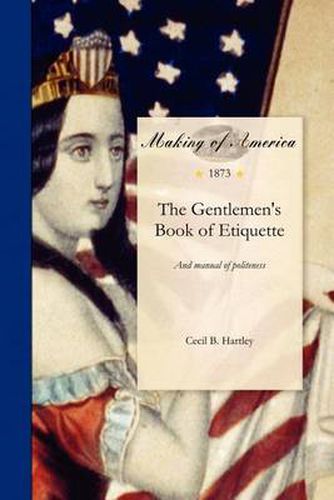Readings Newsletter
Become a Readings Member to make your shopping experience even easier.
Sign in or sign up for free!
You’re not far away from qualifying for FREE standard shipping within Australia
You’ve qualified for FREE standard shipping within Australia
The cart is loading…






The Gentlemen’s Book of Etiquette, and Manual of Politeness, The Book of Etiquette, By Cecil B. Hartley, Etiquette is a code of behavior that delineates expectations for social behavior according to contemporary conventional norms within a society, social class, or group. The French word etiquette, literally signifying a tag or label, was used in a modern sense in English around 1750. From the 1500s through the early 1900s, children learned etiquette at school. Etiquette has changed and evolved over the years. In the 3rd millennium BC, Ptahhotep wrote The Maxims of Ptahhotep. The Maxims were conformist precepts extolling such civil virtues as truthfulness, self-control and kindness towards one’s fellow beings. Learning by listening to everybody and knowing that human knowledge is never perfect are a leitmotif. Avoiding open conflict wherever possible should not be considered weakness. Stress is placed on the pursuit of justice, although it is conceded that it is a god’s command that prevails in the end. Some of the maxims refer to one’s behaviour when in the presence of the great, how to choose the right master and how to serve him. Others teach the correct way to lead through openness and kindness. Greed is the base of all evil and should be guarded against, while generosity towards family and friends is deemed praiseworthy.
$9.00 standard shipping within Australia
FREE standard shipping within Australia for orders over $100.00
Express & International shipping calculated at checkout
The Gentlemen’s Book of Etiquette, and Manual of Politeness, The Book of Etiquette, By Cecil B. Hartley, Etiquette is a code of behavior that delineates expectations for social behavior according to contemporary conventional norms within a society, social class, or group. The French word etiquette, literally signifying a tag or label, was used in a modern sense in English around 1750. From the 1500s through the early 1900s, children learned etiquette at school. Etiquette has changed and evolved over the years. In the 3rd millennium BC, Ptahhotep wrote The Maxims of Ptahhotep. The Maxims were conformist precepts extolling such civil virtues as truthfulness, self-control and kindness towards one’s fellow beings. Learning by listening to everybody and knowing that human knowledge is never perfect are a leitmotif. Avoiding open conflict wherever possible should not be considered weakness. Stress is placed on the pursuit of justice, although it is conceded that it is a god’s command that prevails in the end. Some of the maxims refer to one’s behaviour when in the presence of the great, how to choose the right master and how to serve him. Others teach the correct way to lead through openness and kindness. Greed is the base of all evil and should be guarded against, while generosity towards family and friends is deemed praiseworthy.